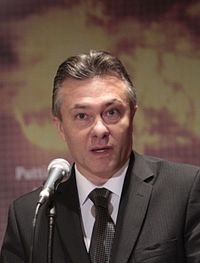Cristian Diaconescu
| Cristian Diaconescu | |
|---|---|

Diaconescu in New York, September 2009
|
|
| Minister of Foreign Affairs | |
|
In office 24 January 2012 – 7 May 2012 |
|
| President | Traian Băsescu |
| Prime Minister |
Emil Boc Mihai Răzvan Ungureanu |
| Preceded by | Teodor Baconschi |
| Succeeded by | Andrei Marga |
|
In office 22 December 2008 – 1 October 2009 |
|
| President | Traian Băsescu |
| Prime Minister | Emil Boc |
| Preceded by | Lazăr Comănescu |
| Succeeded by | Cătălin Predoiu (interim) |
| Minister of Justice | |
|
In office 10 March 2004 – 28 December 2004 |
|
| President | Ion Iliescu |
| Prime Minister | Adrian Năstase |
| Preceded by | Rodica Stănoiu |
| Succeeded by | Monica Macovei |
| Personal details | |
| Born |
2 July 1959 Bucharest, Romania |
| Nationality | Romanian |
| Political party | Independent |
| Other political affiliations |
People's Movement Party (2014) National Union for the Progress of Romania (2010-2012) Social Democratic Party (2002-2010) Romanian Communist Party (until 1989) |
Cristian Diaconescu (Romanian pronunciation: [kristiˈan di.akoˈnesku]; born 2 July 1959) is a Romanian jurist and politician. An independent, formerly a member of the People's Movement Party (PMP) and prior to that of the National Union for the Progress of Romania (UNPR) and of the Social Democratic Party (PSD), he sat in the Romanian Senate from 2004 to 2012, representing Constanța County from 2004 until 2008, and subsequently Bucharest. In the Adrian Năstase cabinet, he was Minister of Justice from March to December 2004; in the Emil Boc cabinet, he was Minister of Foreign Affairs between 2008 and 2009. He returned to the position in 2012, also under Boc, and continued in this capacity under Boc's successor, Mihai Răzvan Ungureanu.
He and his wife Mariana have a daughter.
He was born in Bucharest, where his father Mihai was a lawyer; he is a seventh-generation jurist. He completed his mandatory military service in 1978-1979 within a unit troops answering to the Securitate, Communist Romania's secret police, ending as a 2nd Lieutenant and later recalling that his instruction was purely in regular combat. In April 1982, he entered the ruling Romanian Communist Party, advancing from its mass organization, the Union of Communist Youth. Although he denied having held any executive positions within the party, a 2008 investigation by Evenimentul Zilei newspaper concluded that Diaconescu was promoted to a leadership office within the Association of Communist Students, and that he was judged a good student of Marxism. Diaconescu graduated from the Law Faculty of the University of Bucharest in 1983, also earning a PhD in Law in 2007. He was an associate professor at Hyperion University in 1993, a professor at the Carol I National Defence University in 1997 and at the Institute of Law and International Relations from 1998 to 2000, and in 2004 was on the academic staff of the Spiru Haret University in its International Relations and European Studies Faculty.
...
Wikipedia
